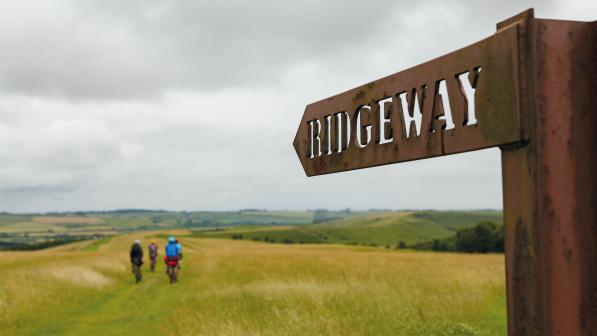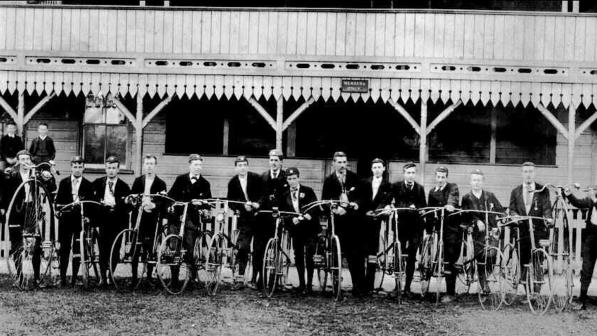The home front

The Great War was indiscriminate: anyone and everyone was affected. Cyclists were among the young men hunched in trenches. Cyclists at home, far from the battlefields, still felt the reverberations. We know this first hand from some of them, thanks to the archives of the Anfield Circular, the newsletter of the Anfield Bicycle Club (ABC).
Formed in March 1879 in Liverpool, the ABC is one of the oldest continuously active cycling clubs in the world. It shares its origins with CTC, which it is now an affiliate group of. Through the Anfield Circular, the many members caught up in the fighting recorded their experiences in their own words as the catastrophe unfolded. On the home front, as conditions grew harder, those who remained behind described how the club kept their pastime going. The immediacy of the reporting is extraordinary: reading the accounts now is like stepping through a door to the world as it was then.
The Circular was the crucial link between home and abroad. It ensured those overseas were not forgotten, and promised a return to normality when the war was over. But it was the inspired decision to send those on service gifts (like tobacco and pipes, chocolate, tinned food, and writing materials) that led to a steady stream of news and first hand reports of the war.
An Edwardian summer
At the turn of the century, the heart of club-life was the Saturday afternoon fixture, every week throughout the year. From Merseyside and Manchester, ABC members would meet at comfortable inns following a ride in the lanes of Cheshire or Lancashire. Often, a few would weekend further afield: a pleasing prospect allowing exploration of Welsh mountain tracks, Shropshire’s pastoral countryside, or the Derbyshire dales.
Those halcyon days, which followed so warm and sociable a pattern of good fellowship, good company, and sportsmanship, ended abruptly."
During the winter there was time for more leisurely riding and social fixtures. Highlights were ‘smoking concerts’, with hot-pots on the menu followed by homespun entertainment. There were official tours too: Easter at Betws-y-Coed in North Wales, August in Ireland, an annual all-night ride, and, rounding off the year, the Autumnal Tints weekend. In addition, from April to September, it was the racing season with members competing for a prize fund worth, in 1914, the equivalent of about £13,000.
But these halcyon days, which had followed so warm and sociable a pattern of good fellowship, good company, and keen sportsmanship, ended abruptly after the August 1914 Bank Holiday.
War declared
The impact of the war was immediate: support for club runs collapsed as young members ‘joined the colours’ and older members volunteered for civic duties. Racing was suspended. Catering was disrupted as the Army took over inns and hotels, and there were visible reminders too. On one club run, the Circular reported:
‘We were kept aware that Old England was at war by the continuous procession of military on the way to Chester, which were met every few miles. The Cheshire Yeomanry in full war kit gave a martial aspect to the countryside, some of the squadrons being splendidly mounted.’
Many clubs did not survive. Some were so decimated that they disbanded, while others, including CTC, were weakened financially and emerged with fewer members.
In the armed forces, cyclists, whether racing men, club riders or tourists, were dispersed widely. Although some were directly called on to use their cycling skills, as despatch riders and in the cyclists’ battalions, most could be found in all arenas and on all fronts.
For those who return
Senior ABC members, like WP Cook (CTC Vice President, Liverpool DA President, and recipient of the Alfred Bird Memorial Award), saw their role as defending club life for those who would return. They redirected the prize fund to ‘War Relief’, re-engaged non-active members (and recruited new), and waived subscriptions for those fighting. But happiest of all was their decision to send members on service abroad monthly parcels of ‘small comforts and luxuries’ to soften the harshness of military life.
The catalyst was a letter from Jack Hodges, in Egypt with the Mediterranean Expeditionary Force. Feeling homesick, he asked if prize money owed him could be drawn to purchase essentials that would make life more bearable. It was the prompt for Christmas gifts to all those abroad. As tokens of remembrance, the gifts were so greatly appreciated that, on Cook’s instigation, the scheme then continued until the end of the war.
One of the recipients was WM Robinson, the cycling journalist ‘Wayfarer’. Fighting in France, far from ‘the open road which we love so well’, he mused that the scheme must have been ‘suggested by the Angels’ for ‘the man who may be called upon at any hour of the day or night to look Death between the eyes, and to glimpse Hell with the lid off’.
Wayfarer invalided
Letters acknowledging the gifts were expected, and crucially each was published. The accounts were written dispassionately, but with humour, irony and wry observation. None ducked the realities of war – whether the unspeakable horrors of the Western Front or the boredom of life away from the action.
Some correspondents were brave enough to express their fear for the dangers they faced. One was Wayfarer, who at the age of 40 served on the Western Front in the Queen’s Westminster Rifles. At first he wrote lighthearted letters about training. But one account stands out, serious in tone:
‘On Monday I joined my Battalion and came at once into the Reserve Trenches. In a few hours time I expect to go into the Fire Trenches for eight days. Then follows a ‘Rest’ – (loud laughter) – and afterwards we keep on going round the mulberry bush.’
Within days, he was severely wounded. Stretchered back to England, recovery from his injuries was slow.
In this hell of wet, mud and cold, normality was living in rat-infested dugouts with death all around and trenches smelling of gas."
Others described the British Expeditionary Force’s retreat from Mons; delivering despatches on an army bicycle under fire; driving field hospital ambulances in Flanders amongst the thick of the fighting; manning a heavy gun battery at the Somme, where the bombardment lasted for weeks and the noise was ‘awful – one continuous roar day and night’. In this hell of wet, mud and cold, normality was living in rat-infested dugouts with death all around and trenches smelling of gas; and where being buried alive when shells exploded too close for comfort was considered a lucky escape.
Correspondents & casualties
There were lighter moments too. George Stephenson, training with the 3rd Yeomanry Cyclists’ Regiment, was booked for not cleaning the inside of his mudguards. Later he was put in charge of 500 army bicycles and men, before ending his military career in the role of stationmaster near Dublin, where he lived ‘a splendid life’. In 1917, Clifford Dews was flying with the Royal Naval Air Service at Vendôme (‘a quaint old place’ where fruit was cheap – ‘fresh peaches at 8d per dozen and Williams pears ½d each’) and Boulogne (‘Hun planes dropped pills all around – a little too close to be pleasant’). At Christmas with the RAF in Greece, he attended a christening party where the ‘oozoo’ flowed freely.
Those in Mesopotamia, Palestine and Egypt found life monotonous and often unpleasant: ‘the mosquitoes are the limit, and cockroaches of enormous size are very plentiful’. All longed for home. Some found bicycles, though a 25-mile ride on a windy day in ‘Ishmailia’ proved tough. In India, Harold Band learned about horsemanship and discovered the monsoon ‘where even WP Cook would have to admit to rain’.
By the end of the war, 44 ABC members were on the Roll of Honour – a third of the membership. Four had given their lives: 2nd Lieutenant David Rowatt and Private Edmund Rowatt were killed at the Somme, David (age 26) on 1 July 1916 and Edmund (age 19) on 30 July 1916. Edmund’s body was not recovered. Corporal Edward Andrew Bentley was mortally wounded in October 1916. He died in hospital at Boulogne on 18 November 1916 aged 31, and is buried at Boulogne Eastern Cemetery. Air Mechanic George Poole died on 4 January 1919 (age 31) at Chester, where he had been receiving treatment for severe frostbite suffered during the winter of 1917-1918.
For DC Rowatt, a veteran from 1890, the war brought disproportionate tragedy. In addition to the two sons killed, another was severely wounded, one more died in the 1918 flu pandemic at the age of 17 and, compounding the heartbreak still further, a fifth succumbed to polio in the years after the war.
Winning the peace
On the home front there was a satirical bite to reports on the war’s impact: the Defence of the Realm Act (nicknamed ‘Dora’) was hated as a virago who restricted pub opening hours, watered beer, banned treating (buying rounds) and required compulsory red lights. ‘Even Dora is powerless against what one can think’ was one defiant comment.
There were complaints about ‘get-rich-quick caterers’, and of meals under ‘Lord Have-no-potatoes’: ‘beef and boiled mutton weighed out at 2.9oz and bread confined to one round’. Worse came with increased prices, vegetables eking out egg rations, and no-meat teas. Members even tried augmenting meals with their own loaves, and using ration books to buy food.
Dodging ‘itinerant specials and prowling policemen’ for a pint, even if awful, was a risky business that led one member to court as a witness in a case about contravening regulations.
News of the Armistice was delivered during a club run at Alderley Edge, on 9 November 1918. At last, members could look forward ‘to the time in the near future when the sporting activities of the club will spring into life again with freshness and vigour’. But winning the peace was not so simple.
Those returning, who found ‘old things old’, decided they wanted new. The ABC’s ban on Sunday racing led to divisions. But despite the unrest, senior members continued to support the young, and, through CTC, the defence of cyclists’ rights nationally. In addition, WP Cook helped raise funds for the National Cyclists’ War Memorial, Meriden, while Wayfarer fired romance and adventure with his journalism and lantern-slide lectures on ‘the Open Road’.
But what truly marked the end of the war for the ABC was the repeal of the hated ‘Dora’ who ‘passed away quietly on 31st August [1921], unwept, unhonoured, and unsung after a lingering illness’.
In 2013, the Anfield Bicycle Club secured a Heritage Lottery Fund grant of £16,000 to conserve and share its extensive archive of documents and photographs, some of which have been used in this article. Digital output from the project, ‘Those Amazing Anfielders and their Cycling Machines in Peace and War’, is available online at anfieldbc.co.uk.
This was first published in the August / September 2014 edition of CTC's Cycle magazine.




